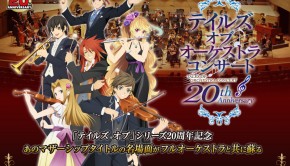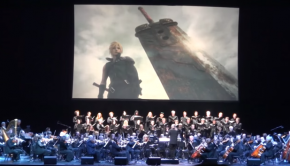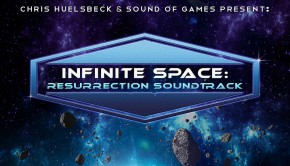Markus Schmidt, Alex Pfeffer & Alexander Röder Interview: The Melodies of Dynamedion
Dynamedion is the leading studio for soundtrack composition and sound design in the European video game industry. The company has pioneered orchestral recordings in game music with major scores to the SpellForce and Anno series. Having featured on nearly 200 projects to date, the company has branched out to encompass sound production for television, film, and mobile games too.
In the fourth part of a multi-instalment interview with Dynamedion, Markus Schmidt, Alex Pfeffer, and Alexander Röder give more insight into the production process at the company. These leading, long-term composers at the company have each worked on multiple major video game scores among other productions. In this interview, they emphasise the teamwork process that goes into creating a major score and their individual responsibilities and specialities. The supplement includes some images photographed by Alex Pfeffer.
Interview Credits
Interview Subject: Markus Schmidt, Alex Pfeffer, Alexander Röder
Interviewer: Simon Elchlepp
Editor: Chris Greening
Coordination: Pierre Langer
Interview Content
Simon: Markus Schmidt, Alex Pfeffer, and Alexander Röder thanks for talking to us today. Could you please introduce yourselves and tell our readers a bit about how you came to work in the music business? When did you start working for Dynamedion, and how did this co-operation come to be?
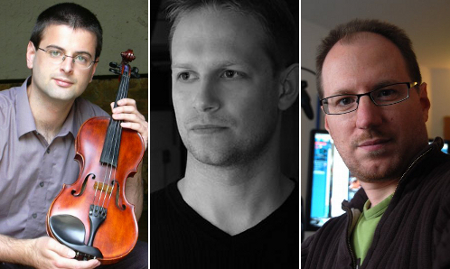
Markus Schmidt: Hi, thanks for interviewing us. My name is Markus Schmidt. I live near Paris and have been working together with Dynamedion for over six years on over 40 video game titles. My work includes live orchestra productions, live played instruments mixed with computer based productions, and custom electronic sound design.
Alex Pfeffer: I’m Alex Pfeffer, one of the lead composers at Dynamedion, currently based in Hamburg. My background is as a private guitar teacher and guitarist for the band Reinvented. Concerning how I became involved in Dynamedion, Pierre Langer was around at the same German game developer forum as I was for a little while, so we already knew each other at least from posting and reading. One day we arranged a phone call and had a good time talking to each other. Pierre asked me if I would be willing to compose some test music for Dynamedion and I gladly agreed. The Dynamedion core team liked what I did … and that was it — I was in!
Alexander Röder: My name is Alexander Roeder. I work as a freelance musician in Germany, mainly for the games industry. Making music was an important hobby for me, until I had the opportunity to join a big game developer here in Germany as an in-house musician — I took the chance and worked for “Sunflowers GmbH” for about eight years, making music for titles like Anno 1602, Holiday Island, Anno 1503, and so on. After this great period, I decided to compose music as a freelancer, so I was able to serve different developers and work on different projects. Shortly before this time, I received a phone call from Pierre Langer and he asked if I would be able to compose some music for Dynamedion and help them reduce their heavy workload. Unfortunately, this wasn’t possible as I was still employed and wasn’t allowed to do so. Some months later, when I decided to go freelance, I remembered this call and made contact with Pierre again, who was glad to have a new team member to complement Dynamedion — consisting of him and Tilman Sillescu at this time. This was the start of a great collaboration.
Simon: In the previous interview, Tilman described Dynamedion’s approach to composing, explaining that after the main theme has been created, additional composers are brought on board. What exactly are you given to work with when you join a project: already composed material, game artwork, indications of the overall style of the soundtrack etc.?
Markus Schmidt: It depends on the project — theoretically, the more information we get about a project the better. Themes may pre-exist or not, or may be composed by us during the process. I’ll let Alexander elaborate.
Alexander Röder: Yes… Sometimes, I receive already composed material like the main theme or other tracks, whereas sometimes I am the one to compose the main theme or the first music for the project. A range of material can help to find the right style for a project, including artwork, videos, and descriptions of the game. In order to gain more specific insight, we make a so-called “spotting session”. This consists of about 30-50 little snippets of music (30 to 60 seconds) from other projects or soundtracks. We put there everything that we think fits with the different situations in the game and the client receives a document where they can comment on the snippets, like for example “fits for combat, but a bit too dull” or “great music, but not our desired style”. With this spotting document and the snippets, we are able to get an exact picture of what the client wants.
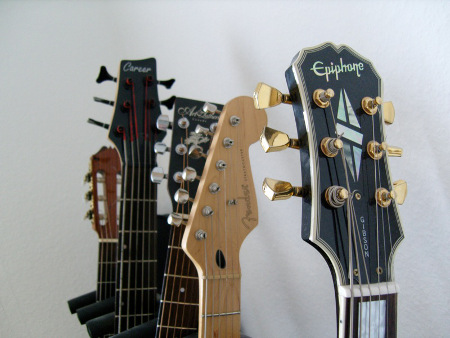
Simon: According to Tilman, additional composers join a Dynamedion project based on their strengths in creating particular kinds of music (one composer is best at writing friendly music, another composer at conjuring darker tones, etc.) What particular kind of music does each of you contribute to a project, and how long did it take to find out what kind of music you’re best at creating?
Markus Schmidt: Yes, the three of us are all quite versatile, but we have different specialities. They usually have me working on the darker stuff.
Alex Pfeffer: I personally really enjoy creating epic battle music with lots of percussion or even with a modern rock section. I really can’t answer if I am best at that, but I am convinced that the mood, passion and joy for a certain style really helps to create well done music.
Alexander Röder: It didn’t really take a long time to realize that I am good at creating lighter tones. Not that I can’t do combat music or dark atmospheres, but there are teammates who are better on the dark side than me, like Markus and Alex! Occasionally, we find out during a project that someone can’t really cope with a certain track or the client refuses music. In this case, we sometimes change tracks between us composers to help out each other.
Simon: It seems that your work on a project will be defined by the artistic decisions and musical material that already exist when you join a project, and by your set role in creating a particular kind of music (happy, dark etc.) How narrow or wide are all these musical parameters that are already set before you start composing? In how far do you feel they are creatively restricting or rather a stimulating challenge, and how do you ensure that you still deliver fresh, original results?
Markus Schmidt: It is both restrictive and stimulating as you imply. To get fresh ideas, I always try to do a research before composing. This can take many shapes — music, literature, film, really anything that will get me deeper in the project.
Alexander Röder: I often feel myself a bit bound by the style the developers have in mind. These expectations are mostly more on the narrow side, especially in the course of the project, where the developers have their favourite pieces of music among our submissions and often want everything in the same beloved style. But I also feel these restrictions stimulating in retrospective (which clears things up a bit!) and I see how these brought my music to a new height sometimes, which is a good process. To remain creative facing all these restrictions is a tough challenge, but I try to hear music from other sources, go out for a walk, play a game, or whatever else to give my mind some rest and continue with some fresh perspectives.
Simon: On a game like The Settlers 7: Paths to a Kingdom, eight different composers were involved. What are the advantages and disadvantages of working with such a big composing team, and generally of composing a soundtrack as a team?

Alexander Röder: Clearly, the biggest advantage is being able to keep the deadlines tight, especially when time is short, which is often the case. Another advantage is the great variety of personal style. Sometimes, I hear the submissions of other team members and consider to myself how great everything is so great and varied (in the given range certainly). The challenge — I don’t want to call it disadvantage, as this would be too strong — is to make everything sound consistent and like a whole. This applies to composition and style as well as sound.
Markus Schmidt: Alexander echoes my thoughts pretty much exactly…
Simon: Once the process of composing has begun, how do you ensure that your creations are coherent with what the other composers working on the project have come up with, and what role does Tilman as lead composer and musical supervisor have in this process? Given that you are based in different cities, how does the exchange of ideas and already composed material among the team members take place?
Alexander Röder: For practical reasons, we have a huge server, which includes all music of the current projects, but also music of past projects, and everyone has access to all the tracks. So when I start a project, I initially go the server to see if someone has already submitted music to the project. If so, I listen through some tracks to get an idea of the overall style.
Markus Schmidt: Depending on the project, a different composer will be leading on the musical style — it’s often pretty clear who has the right touch for a project. When I am not leading a project, what I do is I analyze carefully the work of my partners and adapt myself to produce a coherent style.
Alexander Röder: I should add that Tilman is the person to listen through all of the tracks when we send them and to ensure everything is perfectly suited for the project. So normally, nothing goes to our clients without being “approved” by the project leader. In doubt, Tilman as the creative director decides whether to send a track or rework it.
Simon: When working on projects based on an already existing franchise, such as The Settlers, Halo Legends, or The Dark Eye, in how far do you familiarise yourself with the music that has been composed for previous titles in those franchises?
Alexander Röder: In the case of sequels, it is common practice to take music of the predecessors as spotting music, if the style applies to the new project as well. So it goes the same way as with the different composers: hear the other music, ensure to stay in the same style. There are also some technical issues — for example what instruments should be used or avoided — but most of the process of staying consistent with other music is creativity and sometimes trial and error. I start a track, I listen to others, and when I have the feeling that it doesn’t fit, I decide whether I can make it fit or dump it and start from scratch.
Markus Schmidt: I’ll give a specific example of how past instalments in the franchise can be directly influential. In Drakensang, we used on purpose themes that pre-existed in previous games, and it worked great for several reasons.

Simon: How long does it actually take you to write a piece of music for a game soundtrack, and how long do you work on one soundtrack? What does the process of composing music look like for each of you — do you start out with some sketches, before fleshing them out, or do you create a piece in one go?
Markus Schmidt: As a general rule, we produce one minute per day, but depending on the style it can get faster or slower.
Alexander Röder: That’s certainly true. Some tracks are a lot quicker to produce, like ambient music, and some are slower in the making, like combat or trailer music, which is a lot more demanding. My way of working is to play around with one instrument until I have desirable feature — a strong melody, a good accompaniment, a riff, or a musical texture — and once I have it, I normally compose from the start of the piece until the end. Often, I change something at the beginning if it doesn’t feel right with the rest and, once I am finished, I give some finishing touches and changes here and there until I am satisfied. This is my way of working for about 97% of my music.
Alex Pfeffer: Yeah, it really depends on the project and what mood I am in. Sometimes I just need a few hours or days for a decent hookline or a stand out rhythm section. In addition, sometimes the full composition just literally explodes fully arranged in my head and I just try to record, write down, and generally “catch” as much as I can.
Alexander Röder: As for how long I work on one soundtrack, it depends on how much tracks I have to do, how tight the deadlines are, and how much projects I have at the same time. This can go from one week to half a year.
Simon: Between the colourful orchestrations of The Settlers 7, the more ambient soundscapes of Legend: Hand of God and the dark fantasy atmosphere of Drakensang, the projects you’ve been working on encompass quite a number of different styles and moods, not to mention all your other game, TV and film projects. In an interview, Jeremy Soule once explained his musical versatility by saying that, as a professional musician, he can engineer music just like someone at Boeing might engineer an aircraft. Do you feel the same about a musician’s capacities to adapt and create readily and at all times?
Alex Pfeffer: I think Jeremy mentioned a really good point! We, as composers, have our toolboxes the same as an aircraft engineer does. As soon as we see screenshots or read the script of a new project, we simply have to be able to pick the right tools and start to create music.
Alexander Röder: Exactly… well put, Jeremy. I know that not every musician feels the same, but I see myself as a good craftsman. I know my tools, I know my capabilities, I know how to do the things I do. I am not able to deliver all styles in perfection, but I can familiarise with every style and do something similar with my personal colorisation.
Markus Schmidt: Yes, it’s a fundamental part of the job to be able to produce a very wide scale of different styles.
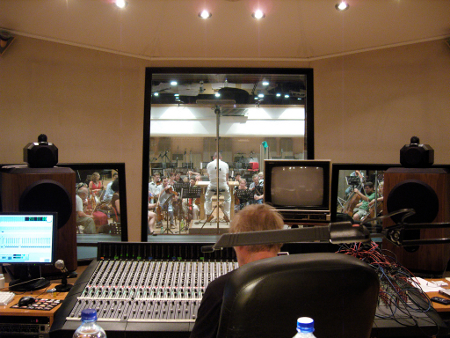
Simon: Dynamedion’s scope extends beyond orchestral game music to casual and portable games, trailer music, and television productions. To what extent are you each involved in these extended areas? How do you approach these projects compared with high-profile game projects?
Markus Schmidt: Well, each project demands an unique approach. However, there really is no rule to it — generally we do our very best, for small as well as big projects.
Alexander Röder: I can say, that I am involved in most projects we do. Perhaps one array, where I am not the “go to” person is rock and pop music. This is an area where we have some more specialised musicians, who can cope with this style quicker and better. I also am not the right person for a shooter, but besides these areas, I am mostly involved. As for my approach, it’s consistent in the sense that I do the best job that I can do, just as Markus said!
Alex Pfeffer: Besides games I am also involved in lots of trailer music and pop music productions. The big difference is that you don’t have to deal with interactivity in pop and trailer music. Also these three styles are there for very different reasons. While computer game music is to sonically support the game and the player in what he does, trailer music is there to sell movies and make peoples jaws drop while in the cinema. Then again, pop music is not really connected to a project. There is total focus on the artist and their music.
Simon: All of you are involved in a number of other companies and projects outside of Dynamedion. How do you schedule your co-operations with Dynamedion around your other projects and how do you make sure that you work on a Dynamedion soundtrack at about roughly the same time as the other composers on your team?
Markus Schmidt: In terms of time management in general, my approach is simple. It comes as it comes and what comes first, comes first…
Alexander Röder: Cooperation is not so much of a problem. If I have scheduled music to do music for other companies and and the project delays such that I can’t do it anymore, I ask the client if someone else from our team at Dynamedion could do the job instead. Mostly this is no problem, given that I ensure that the output meets my personal standards and the client’s needs, which is usually possible with our excellent composers! Ensuring that we all are fully charged is a nice job for the project leader. Plus I cry at Pierre’s direction when I have nothing to do and I also cry when I’m loaded too heavily, so there’s no problem here either. Although we’re not always in the same studios, we keep in touch very closely. We have a Skype meeting every monday, we have email, we have phone… Everything flows in a positive way.
Simon: After the composition of a work is finished, in how far are you involved in the implementation of your music into the final product? Are you present at the recording sessions, and if so, in how far do you have a supervising function during these sessions to make sure that the orchestra realises your creative vision?
Markus Schmidt: We are sometimes on orchestral recordings, but generally not implied in the integration process, as we have a dedicated team for this.
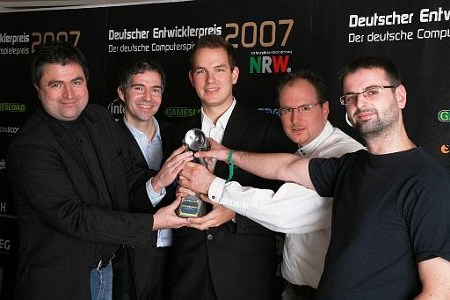
Alexander Röder: Yes, like Markus, I’m not involved in the implementation. This is a task I was never asked to do, so I leave it as is. I’m more involved in recording sessions. If my time and deadlines allow, I attend the sessions and in fact supervise my tracks and ask for different interpretations if needed. If I can’t be there, I can fully trust that Tilman understands my musical vision with each of the tracks and makes the most out of it.
Simon: Thanks you so much for taking the time to answer these questions. Is there anything else you would like to add about your work? In addition, is there any message you would like to leave our readers with?
Alex Pfeffer: To me personally the most important thing is to never stop learning. The day you stop studying is the day you stop evolving.
Alexander Röder: I hope you all enjoy the creative output of Dynamedion and let yourself be carried away into new worlds by our music.
Markus Schmidt: Thank for your support! We appreciate this interview opportunity.
Posted on June 29, 2010 by Chris Greening. Last modified on May 21, 2014.


